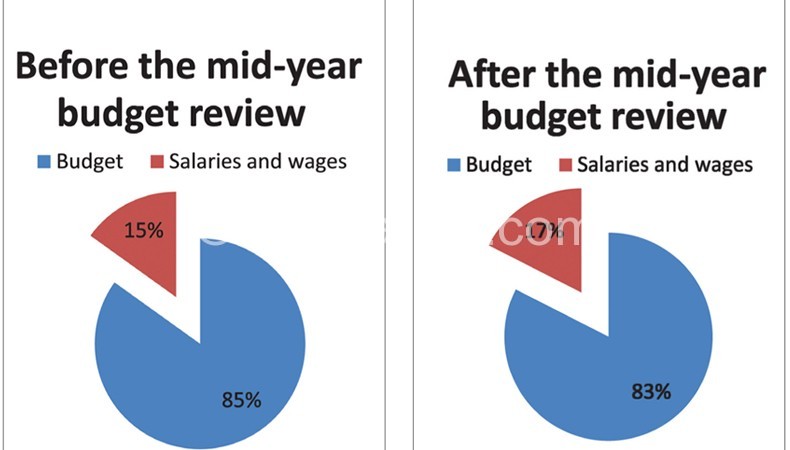Malawi public wage bill up K30bn
The public sector wage bill now stands at K163.3 billion (about $385m), representing an increase of K30 billion (about $70m), The Nation has learnt.
Economic experts have since warned that at roughly 23 percent this fiscal year alone, the personal emoluments budget in the public sector is growing too fast compared to the value it is generating to the economy.
 In view of this development, one of the experts says the increase in the wage bill would negatively impact on the sustainability of the country’s economic growth trajectory “in the current context of the already subdued economic growth environment for Malawi.”
In view of this development, one of the experts says the increase in the wage bill would negatively impact on the sustainability of the country’s economic growth trajectory “in the current context of the already subdued economic growth environment for Malawi.”
The Ministry of Finance, Economic Planning and Development yesterday confirmed the increase in the public sector wage bill, triggered mainly by a burgeoning payroll following a 45 percent average civil service salary hike last year which pushed up the wage bill initially by K10 billion before other forced increments, although at much lower rates, raised it to the current levels.
Last October, government succumbed to civil servants’ salary hike demands and affected a 45 percent pay hike after public service trade unions rejected a 24 percent average wage increment that was planned for the 2014/15 financial year.
Ministry of Finance spokesperson Nations Msowoya said prior to the Mid-Year Budget Review, Malawi’s public sector wage bill stood at K133 billion, implying that the cost has now jumped by 23 percent.
Malawi’s approved national budget for the 2014/15 fiscal year after the midyear review is pegged at K770 billion from an initial K748 billion following a K22 billion supplementary spending approved by Parliament last month.
Our calculations show that a K163.3 billion wage bill represents 7.4 percent of the country’s total wealth as measured by the gross domestic product (GDP) valued at K2.2 trillion.
The figure also represents 30 percent of the total recurrent expenditure estimated at K550 billion in the 2014/15 National Budget.
Among others, the extra funding is also meant to cover an increase in the interest bill and a rise in the Farm Input Subsidy Programme (Fisp) budget, according to Minister of Finance, Economic Planning and Development Goodall Gondwe.
Reacting to the increase in the public sector wage bill, an economic governance expert at the Centre for Social Concern (CfSC), Mathias Kafunda, yesterday warned that additional wage pressure is likely to have adverse effects on government’s investment pattern, thereby impacting negatively on developmental projects.
Said Kafunda: “This [rise] means that government expenditure will increase significantly, thereby necessitating increased borrowing and, therefore, increasing interest rates and crowding out the private sector from [accessing] credit.”
He said the bloating of the bill comes at a time the country is attempting to reform the civil service.
The situation, he said, signals trouble ahead, including difficulties in implementing the reforms.
Kafunda also wondered whether “productivity is actually reflective of the ever bloating wage bill”.
Economist Gilbert Kachamba, who heads the economics department at the Catholic University in Chiradzulu, warned that in the context of a widening budget deficit, government will likely resort to costly domestic borrowing which in turn would lead to higher interest rates as the liquidity in the market decreases.
On a positive note, however, Kachamba said an increase in expenditure emanating from the public sector salary hikes could result in improved livelihoods as the vulnerable are cushioned from the negative effects of policy reforms.
Earlier, Msowoya said the increased expenditure is expected to be financed by pledged additional grants, projected excess tax revenue and domestic borrowing.
In the current fiscal year, government is also reeling from salary hike demands from public servants, notably those outside the mainstream civil service such as the Judiciary, the Anti-Corruption Bureau (ACB), the University of Malawi (Unima) and Parliament secretariat.
If government succumbs to these demands, the wage bill could rise even higher, potential destabilizing national budget implementation.





